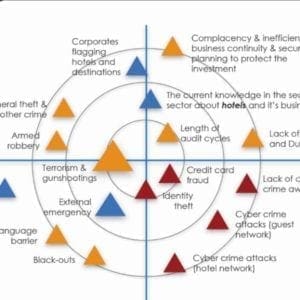To staff the UK hospitality industry in the future, the free movement of labour is an essential.ÊPut simply, evenÊgiven low levels of migration there will not be a big enough working age population to fill all of the jobs that will be available. The sums do not add up!
The hospitality industry should be getting very concerned as to how, and from where, they are going to be recruiting professional staff post-Brexit. This is not a political argument of the merits or otherwise of brexit, but a basic economic equation of supply and demand.
The government’s stated ambition to reduce net annual migration to Òtens of thousandsÓ may resonate politically but makes no sense economically. As a target, it is based, not on population projections, labour market forecasts nor industry views but on a response to popular sentiment. In simple terms if UK plc is to remain economically sound with a viable hospitality industry post-Brexit: the sums do not add up!
The Office of National Statistics (ONS) produces huge amounts of population forecasts and labour market data that even with the most basic analysis, indicates that political ambition and economic reality cannot be reconciled.
 In June 2017 the ONS produced a regular UK Labour Market Survey in which it reported the following:
In June 2017 the ONS produced a regular UK Labour Market Survey in which it reported the following:
The total number of people employed in the UK is 31.954 million of which 30.746 million are between the ages of 16 and 64 with the balance of 1.208 million over the age of 65.
There are estimated to be 2.32 million EU nationals in the UK workforce, plus 1.23 million non-UK or non-EU nationals. Therefore the UK national workforce (excluding the migrant contributions be they EU or non-EU) is currently 28.404 million.
The total number of unemployed is currently 1.540 million, of which those over 65 seeking work, number 13,000. This level of unemployment has not been seen since June 1975.
The proportion of the population recorded as being Òeconomically inactiveÓ is 8.85 million. Economic inactivity can result from a wide number of reasons, not actively seeking work, undertaking child care, having a disability that prevents employment or long-term illness.
The UK currently has very low unemployment and the lowest rate of Ôeconomic inactivity’ since comparable records began in 1971.
The ONS also produces population forecasts based on current population demographics and potential migration factors. Taking the ONS data and assuming low levels of future migration, the resultantÊ graph illustrates that the working age population (for these purposes defined as being between 20 to 64) remains relatively constant between 2017-Ê 2039. There is a short short-term rise till 2020 and then a decline year-on-year.
 The population numbers below the age of 20 is currently estimated at 15.418 million and this remains relatively constant over the period with some minor growth during the middle of the period to 15.999 million byÊ 2039. However the very significant area of population growth is in those over the age of 65, from 12.24 million in 2017 rising to 17.933 million by 2039.
The population numbers below the age of 20 is currently estimated at 15.418 million and this remains relatively constant over the period with some minor growth during the middle of the period to 15.999 million byÊ 2039. However the very significant area of population growth is in those over the age of 65, from 12.24 million in 2017 rising to 17.933 million by 2039.
In very broad terms the young and working age populations remain relatively constant at a time that the 65+Êretired population rises very significantly.
These population forecasts are also assuming that the UK economy will remain healthy and that the EU nationals currently in the UK will remain as part of the workforce. A report by Deloitte, ÔPower Up, The UK Workplace’ published in June 2017 suggests that the UK currently remains an attractive destination for migrant talent but that,Ê”the attitudes of government and business to attract global talent are only one side of the equation”. It goes on to note that in their survey of non British workers in the UK, some 47 per centÊare considering a ÔBrexodus’ and leaving the UK in the nextÊfive years. The reasons that they were attracted to the UK in the first place, jobs, cultural diversity, lifestyle and a sense of welcome, may well become the very factors that the post-Brexit UK is no longer able to offer.
What are the implications for the UK hospitality industry when over 21 per centÊof the workforce are non British and 47 per centÊcould choose to leave within the next five years? These issues also need to be considered alongside the recent KPMG report for the British Hospitality Association (BHA). This report suggests that there will be a continuing need for EU nationals in the hospitality workforce of at least 67,000 a year over a ten-year period, just in order to maintain the current staffing levels within the industry.
The general and oft heard political statements, that suggest the long term industry solution is to; increase pay, make the industry more attractive to UK workers and make significant investments in training, are in themselves laudable, but they are also quoted to every other industry that has a significant migrant workforce. As this rather basic analysis shows, the size of the UK workforce, even assuming a low level of migration in the hundreds, not tens of thousands, will remain fairly constant at or near current levels. Without a continuing external source of professional staff where will the future staff come from? This analysis suggests that in terms of basic maths its cannot come from within the UK population.
The hospitality industry will be competing for ever scarcer resources. Investment in training and education, raising the profile and career opportunities the industry offers and changing the public perception of the industry needs to happen now. The lead time for this strategy will be a minimumÊofÊfive years. On current projections we have not got that long, unless we have some fairly dramatic shifts in perception and reality, the only segment of the population that will be able to satisfy the industry’sÊfuture employment needs will be the over 65s!
By Professor Peter A. JonesÊ
Professor Peter Jones is the Dean of the eHotelier Academy. With aÊdistinguishedÊcareer in hospitality, education and training, Peter has been involved with national and international projects with clients involved in hospitality education.ÊPeter is a Director of the Edge Hotel School and of Hotel Future, a new education and training initiative in Greater Manchester and is a Visiting Professor at the University of Derby. He was also awarded a Member of the Order of the British Empire for services to the hospitality industry.
Want to keep up to date with industry news? Click here to subscribe toÊeHotelier’s dailyÊe-newsletter.

Ê




















